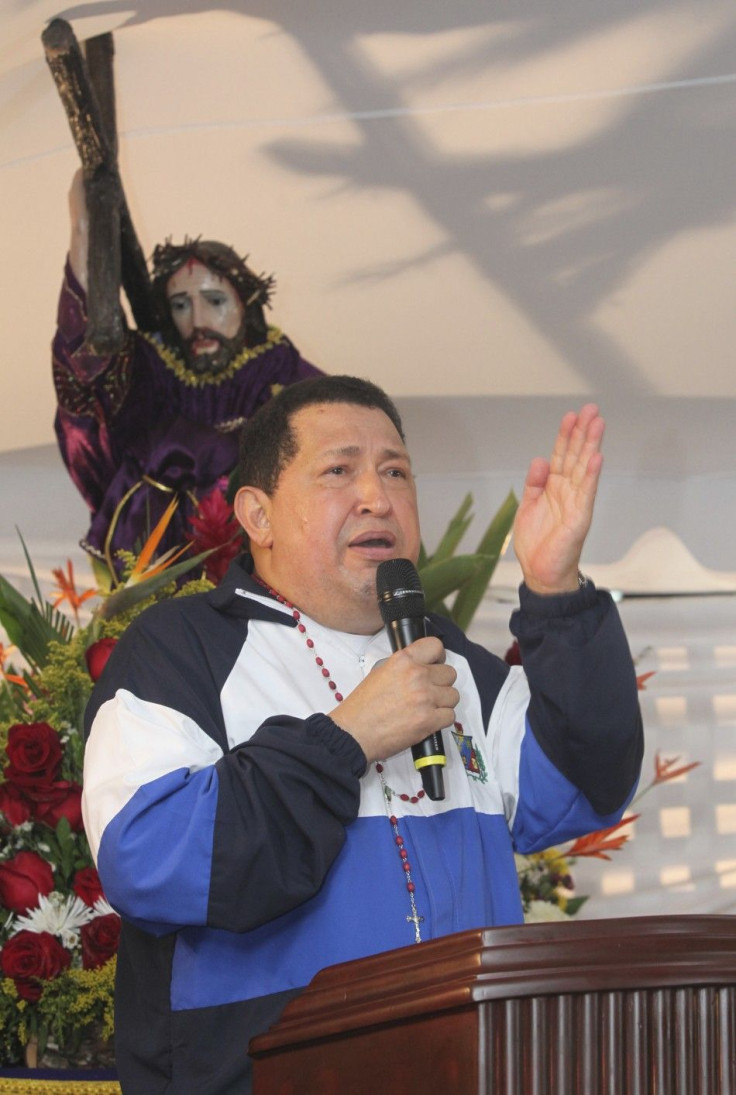'Fake' Or 'Deadly': Venezuela's Fate Hangs On Chavez's Cancer

Venezuelan politics has almost willingly let President Hugo Chavez's terminal illness hijack the ongoing presidential election campaign, which would have otherwise been its best chance to reassess his 13-year-long governance and revolutionary brand of socialism.
The rampant rumors surrounding his cancer have apparently turned most Venezuelans into conspiratorial oncologists, and in the process crowded out issues like national housing crisis, power shortages, alarming surge in crime rate, inflation, weakening economy and rebranding of the leftist authoritarianism to accommodate the concerns regarding the state of democracy.
Chavez's illness has taken the center-stage due to the fact that Venezuela has a personalistic type of regime, Carlos Blanco, author and a prominent opposition intellectual, told International Business Times.
Chavez commands the complete focus of his party, of the military, and of all the branches of the state. He is the center of an unstable equilibrium which without him will tumble, he said.
Blanco, who has previously served as the Minister for the Reform of the State of Venezuela, is not sure of Chavez's chances to get reelected under the current circumstances. However, Blanco says it is very probable that without him as candidate his party will be defeated and the revolution will end. That is why almost any political outcome depends on Chavez's health.
Blanco dismissed rumors that Chavez could be faking his illness in a desperate act to gain sympathy, saying that the disease has created a lot of turmoil in his ranks which is extraordinarily costly for them.
All educated info says that the illness is real and very bad, and the international punishment for simulating a situation like this could be too dangerous, Blanco said.
Many Venezuelans, who despise Chavez's authoritarian policies that have failed to address the mob-sponsored anarchy, have grown suspicious of the cancer. Most Venezuelans, regardless of being chavistas or not, look tired of more than 13 years of unrest, Blanco said.
Refering to speculation that Chavez could be enacting a political drama, Stephen Johnson, director of the Latin America program at the Center for Strategic and International Studies in Washington, told Foreign Policy Magazine recently: He is pulling all the stops for sympathy and will likely get it from his support base,
The ailment, regardless of the stories surrounding it, could boost as well as undermine his chances of winning another presidential term.
He still has high support but if he appears ill and handicapped, he may not be fit to win the elections, Blanco said.
But if he transforms his situation into a kind of martyrdom -- which seems to be what is doing -- he may be able to keep a lot of support.
In an emotionally charged prayer during a pre-Easter Mass, Chavez recently pleaded with Jesus to spare his life since he has more to do for the country. The 57-year-old socialist leader attended mass last Thursday after returning from his latest session of cancer treatment in Cuba.
Chavez has undergone three surgeries in less than a year and two sessions of radiation treatments. However, details of Chavez's ailment as well as the type of cancer he is suffering from are not known, according to a Reuters report. He said the surgery was successful and that he was hoping to recover to contest the upcoming election in October to win a new six-year term.
Speaking to the Catholic service in his home state of Barinas, the Venezuelan leader wept and prayed to Jesus in a voice that kept breaking.
Never forget that we are the children of giants... I could not avoid some tears, Chavez said, to an audience including his parents and relatives. Give me your crown, Jesus. Give me your cross, your thorns so that I may bleed. But give me life, because I have more to do for this country and these people. Do not take me yet, Chavez added, standing below an image of Jesus with the Crucifix.
Chavez termed his struggle with cancer a hurricane adding that Who said the path of revolution would be easy?
Salvador Navarrete, a Venezuelan doctor believed to be close to Chavez's family, said last October that the president had sarcoma and less than two years to live. However, he fled the country following the revelation when Venezuelan intelligence officials visited his home.
Venezuela, which tops Bloomberg's recent list of countries rated by their misery rate, is in a dire need of an overhaul no matter what the election outcome may be. Henrique Capriles Radonski, the 39-year-old political opponent of Chavez, who won a primary in February, however, hasn't been able to steer his campaign focus in the right direction to focus on socio-economic issues rather than his opponent's cancer.
© Copyright IBTimes 2024. All rights reserved.












